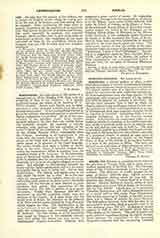

Ambrosiaster, the name given to the author of a commentary on all the Epistles of St. Paul, with the exception of that to the Hebrews. It is usually published among the works of St. Ambrose (P.L., XVII, 45-508). Before each Epistle and its interpretation a short prologue is found which sets forth purpose and context. In the commentaries the text is given by sections; and for each portion a natural and logical explanation is furnished. All in all the commentary is an excellent work. Some modern scholars believe it the best that was written before the sixteenth century. Its teaching is entirely orthodox, with, perhaps, the sole exception of the author’s belief in the millennium. The Latin text of the Pauline Epistles differs considerably from the Vulgate. According to all appearances it was taken from the version known as the “Itala”. Reference to the Greek text is rarely found; in fact the writer seems to be ignorant of the Greek language. The author hardly ever seeks a hidden or mystic sense in the text; hence it becomes evident how widely the commentary differs in character from the exegetical works of St. Ambrose. In his interpretations of Scriptural works St. Ambrose is not much given to research into the natural and literal meaning. Generally he is in quest of a higher allegoric or mystic sense. And although he distinguishes between the literal and the higher signification, still it is the latter principally that he tries to bring out. Not so with Ambrosiaster. The natural and logical sense is the only object the writer has in view. As to the time when the commentary was written, there are many indications which point to the latter part of the fourth century. Of the heresies or sects referred to, none antedates that period. The persecution of the Emperor Julian (361-363) is spoken of as a recent occurrence. Finally Pope Damasus (366-384) is mentioned as actually presiding (hodie) over the destinies of the Church. It is quite likely that the writer lived in Rome; his reference to the primacy of St. Peter and the power wielded by Pope Damasus would suggest the idea. The identification of the writer however is not so easy. During the Middle Ages the commentary was commonly ascribed to St. Ambrose. The first doubts as to his authorship were raised by Erasmus in the sixteenth century; since that period the author has been known as Ambrosiaster (Pseudo-Ambrosius). Scholars have suggested a great variety of names. St. Augustine, in quoting a passage from the commentary, attributes it to St. Hilary; hence some writers believed that either St. Hilary of Poitiers, or St. Hilary of Pavia, or the schismatic deacon Hilary of Rome was meant. Others sought the writer in St. Remigius, in the Pelagian Bishop Julian of Aeclanum, in the African writer Tyconius, in the schismatic priest Faustinus of Rome, or in the converted Jew Isaac of Rome. Most of these views are mere conjectures, or directly opposed to the facts known about the writer. The more recent opinion is that the author of the commentaries is also the author of the pseudo-Augustinian “Quaestiones Veteris et Novi Testamenti”. According to a suggestion made by Dom Germain Morin, O.S.B., and adopted by A. Souter, the author of these commentaries was a distinguished layman of consular rank, by the name of Decimus Hilarianus Hilarius.
FRANCIS J. SCHAEFER

